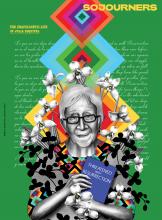POLITICAL SCIENTIST Gene Sharp, in his seminal trilogy The Politics of Nonviolent Action, listed 198 methods of nonviolence, from protest and persuasion to noncooperation and nonviolent intervention. The people we profile in Sojourners, and the stories we highlight, often exemplify these various methods, and this issue is no exception. Guatemalan poet, theologian, and peace activist Julia Esquivel used the power of transformative words to confront, demystify, and, in ways often impossible to see until years later, weaken her country’s dictatorial regime and by extension other autocratic rulers.
Read the Full Article

Already a subscriber? Login